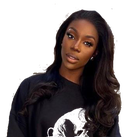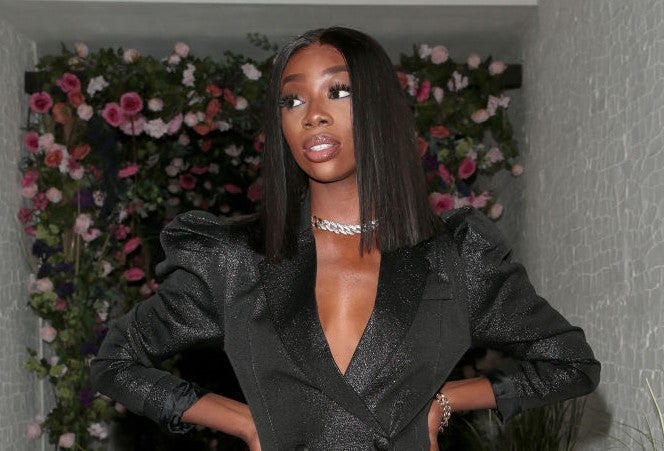Colourism can be devastating – it’s time to have some uncomfortable conversations
The row over whether Rochelle Humes or Candice Brathwaite should present a documentary about maternal mortality among black women indicates that black women who do not possess Eurocentric features are still treated differently to lighter and mixed-race women


#StopErasingBlackWomen – it is a hashtag that has stuck with me. It created a safe space for black women to openly discuss everything, from issues of colourism within the entertainment industry to the poor maternal health outcomes of black women in the NHS.
There is a conflict between colourism and acknowledging its existence in our community/society. Rarely do we discuss its complicated history. According to the Oxford dictionary, the term colourism, coined in 1982, is used to describe “prejudicial or preferential treatment of same-race people based solely on their colour”. Understanding this history is crucial to dismantling policies and practices that continue to adversely affect us.
The ownership of slaves by white men regularly resulted in the physical harm and rape of black women, leading to “race mixing” in the 1600s. This created a social hierarchy: those born through race mixing had privileges over those with darker skin colour.
Many slave owners displayed a preference towards lighter skinned slaves because of their Eurocentric features. They demonstrated this preference by assigning them less strenuous work and allowing them to remain inside, rather than work outside in horrific conditions.
As time went on, society attached various meanings to these colour differences, including assumptions about socioeconomic class, intelligence, physical attractiveness, as well as emotional and mental strength. Those of lighter skin are therefore awarded social and economic privileges because of their closer phenotypic resemblance to white people.
I think the time has come to have these difficult conversations, to acknowledge when they make us feel uncomfortable, or remind us of our own individual pain. The effects of colourism in our society can be devastating. As a dark-skinned black woman, I grew up with feelings of hatred towards my skin, never feeling appreciated, loved or seen by society and by those around me.
Dark-skinned women are not looking to be pitied; we want to be heard and not dismissed. We should be allowed to be at the forefront of our trauma and tell our own stories.
Earlier this week, Rochelle Humes announced on Instagram that she was filming an investigative documentary, looking at the higher rate of maternal mortality of black women in the UK. There was then a row on Twitter when Candice Brathwaite stated that she was "gutted" she wasn’t chosen to present this documentary.
Brathwaite later explained that she was not “replaced”, but that the production company she was working with had decided not to move forward with the documentary, as Humes's had been commissioned first. According to Brathwaite, the production company working with Humes explained that she was "never in the running" to host this documentary. Why? Because, according to Brathwaite's statement on Instagram, they like their hosts to be "removed from the situation", in order to allow for an element of discovery.
These are the realities of politics in television. However there is an equally compelling argument that documentaries fronted by individuals who have experience of the subject, which Brathwaite does, would be more genuine and relatable to viewers.
Maternal mortality holds a lot of importance in the hearts of black women and the documentary should therefore be voiced by a black woman. Someone like Brathwaite, who is so passionate and has done so much work on this campaign, would have been an excellent candidate.
Reports show that black women are still four times more likely than white woman to die in pregnancy or childbirth. To have your trauma dictated by someone who has not experienced it and to be pushed to the side can be quite frustrating.
Why does this matter? Why does it matter that a woman of mixed ethnicity is presenting a documentary, which focuses on issues affecting black women? Why does it matter that a black woman with immense experience was "never in the running" to present this documentary? Because it indicates that society still overwhelmingly believes that black women who do not possess Eurocentric features are not considered to be intelligent, beautiful, soft and vulnerable enough in comparison to lighter and mixed-race women.
Brathwaite’s experience with the birth of her daughter is well documented. She says she was treated differently to other white mothers in the same position. “I was told, ‘you’re overthinking it, it’s your first kid. [Later], I was told, ‘we’re taking you into theatre or you won't be here tomorrow.’” Black women are dying because of the bias in medicine.
Research in America highlights the association between skin tone and physical wellbeing among African Americans. Previous studies have found that dark skin is associated with increased risk of high blood pressure and hypertension among African Americans. Studies also reveal that, specifically, African Americans with lighter skin may experience better healthcare than those with darker skin as a consequence of their position in the socioeconomic hierarchy.
It is an indisputable fact that colourism therefore constitutes an ideological and structural system of inequality that affords special advantages to lighter-skinned individuals. We must all acknowledge this issue and make a conscious effort to dismantle it in our society and community.
Constant challenges that black women face include contending with hostile and racist media institutional environments when in pursuit of industry work. As a dark-skinned black woman, I want to see us represented instead of being replaced across all industry channels. #StopErasingBlackWomen.
Yewande Biala, 24, is a cancer scientist who appeared on ITV2 reality show 'Love Island' in 2019




Bookmark popover
Removed from bookmarks